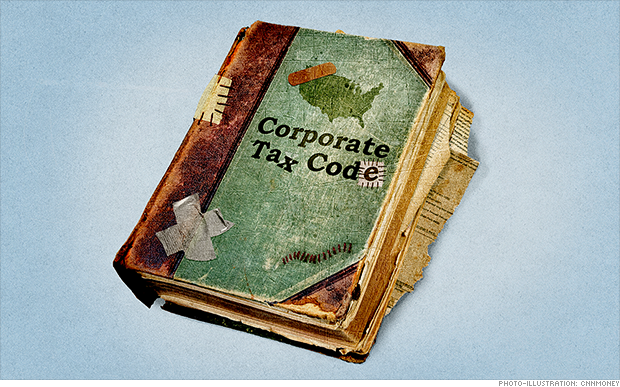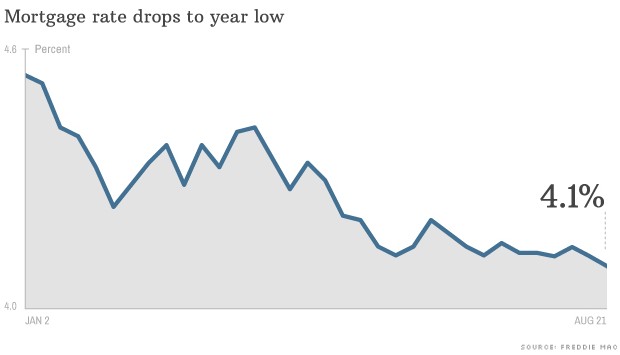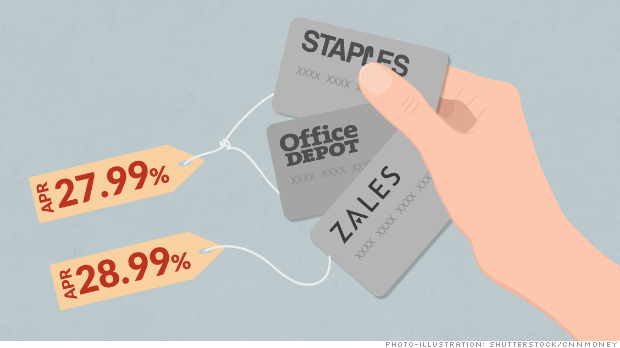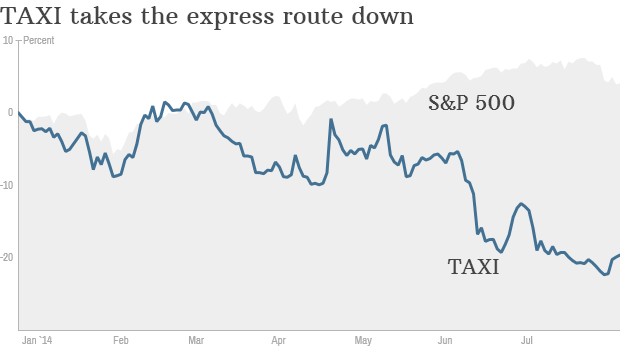
Want to sound smart at your next Washington cocktail party when everyone is talking about "inversions?" Read on ...
NEW YORK (CNNMoney)
But the real problem, most agree, is the corporate tax code, which hasn't kept pace with the transformation of global business over the past 30 years.
Some people think next year might be the year when Congress finally reworks how companies are taxed.
A wonk can dream.
In the meantime, there will be plenty of rhetoric about the issue. Here are 7 key facts to help you keep things straight.
1. Corporate tax revenue accounted for 10% of all federal tax revenue last year. That's less than a third of what it was at its post-war peak, in 1952, according to the Congressional Research Service.
There are a few reasons for the drop-off, CRS notes. Among them, corporations' profits and the percent of their profits paid in taxes have fallen.
Also, many businesses (partnerships, limited liability companies and so-called S corps) have chosen to file under the individual tax code because they get a better deal that way.
2. Only 6% of businesses file under the corporate tax code. And they account for less than half of all business income, according to CRS.
By contrast, in 1980, 17% of businesses paid the corporate tax and generated nearly 80% of business income.
Related: Walgreens to remain an American company
3. Corporate tax breaks cost U.S. coffers about $150 billion last year. That's a lot. But it's a fraction of the more than $1 trillion of individuals' tax breaks in 2013.
One way both are similar: The 10 biggest breaks account for a large majority of the total cost.
4. The U.S. has the highest tax rate among developed economies. Most U.S. corporate income is subject to a 35% federal tax rate. But the "effective" rate companies pay is often lower after accounting for a company's tax credits, deductions and exemptions.
What's more, companies owe U.S. tax on profits they make in the United States and abroad, minus whatever foreign tax they've paid. But a company can put off paying U.S. tax on foreign profits indefinitely, so long as it doesn't bring those profits back to U.S. shores and reinvest them in the business.
Related: Chicken 'poop' credit and other bad corporate tax breaks
Critics say this high-rate, "worldwide" tax system hurts U.S. companies with foreign rivals. In many other countries, companies typically not only face lower rates but don't owe their home country tax on earnings made offshore.
5. U.S. corporations are not taxed equitably. The tax code favors some activities and investments over others, and creates opportunities for certain firms that others can't use.
For instance, it's good to be a U.S. company working abroad.
"They have opportunities to shift profits from U.S. operations to tax havens that wholly domestic businesses do not," said Martin Sullivan, chief economist at the publisher Tax Analysts.
Even among U.S. multinationals, the playing field isn't quite level.
"Companies with lots of patents, trademarks and other intellectual property have the greatest ability to shift profits to tax havens. That's why tech, pharma and medical device companies all tend to have such low effective tax rates," Sullivan said.
(See, for example, how Apple lowers its rate.)
6. Many big U.S. companies are swimming in untaxed cash. Since U.S. multinationals only owe U.S. tax on foreign earnings when they bring them back to the United States, there's serious incentive to put off that day of reckoning.
End result: Many companies have built up a serious offshore cash stash. Apple (AAPL, Tech30), for instance, has more than $100 billion sitting outside the United States. Microsoft (MSFT, Tech30) has roughly $93 billion, while Pfizer (PFE) has an estimated $69 billion, according to Mindy Herzfeld, a contributing editor at Tax Notes International.
7. The pace of U.S. companies looking to leave has picked up dramatically. Between 1983 and 2003, 29 U.S. companies reincorporated abroad in a process known as "inversion." From 2004 to 2013, there have been 47, according to CRS. And this year alone there have been at least 15 proposed inversion deals, Tax Notes reports.
Many lawmakers believe a lower U.S. corporate tax rate could help deter companies from leaving.
Some in Congress are also pushing for the United States to move away from a "worldwide" tax system to a "territorial" one. In a territorial system, corporations would only owe U.S. tax on profits made in the United States. Any profits they make offshore would be taxed by the countries where those profits were made.
In any case, the tax reform proposals put forth so far by some key lawmakers "would leave considerable advantages" for U.S. companies that move abroad, Sullivan said. "So there probably will still be incentive to invert after tax reform."
First Published: August 14, 2014: 9:05 AM ET
 Dollar General reported earnings today and reaffirmed its interest in buying rival budget-retailer Family Dollar.
Dollar General reported earnings today and reaffirmed its interest in buying rival budget-retailer Family Dollar.  The Suzuki Kizashi is the latest car to be recalled due to problems caused by spiders.
The Suzuki Kizashi is the latest car to be recalled due to problems caused by spiders. 

 Click chart for in-depth premarket data.
Click chart for in-depth premarket data. 
 (Left to right) Stephanie Lozito, Andrew Nyman, Greg Johnson and Katey Johnson
(Left to right) Stephanie Lozito, Andrew Nyman, Greg Johnson and Katey Johnson  BattleShop users tailor their closets to the weekly theme
BattleShop users tailor their closets to the weekly theme  Gallery - Priciest cars sold at Pebble Beach
Gallery - Priciest cars sold at Pebble Beach 

 Traffic lights are easy to hack, and they're unlikely to be fixed, according to computer researchers.
Traffic lights are easy to hack, and they're unlikely to be fixed, according to computer researchers.  The S&P 500 hit an all-time high of 1,991.67 Thursday morning.
The S&P 500 hit an all-time high of 1,991.67 Thursday morning. 


 Family Dollar rejected a $10 billion bid from Dollar General and is sticking with its plans to merge with Dollar Tree.
Family Dollar rejected a $10 billion bid from Dollar General and is sticking with its plans to merge with Dollar Tree.  Facebook director of hardware design Gio Coglitore shows off Blu-ray discs used in the prototype.
Facebook director of hardware design Gio Coglitore shows off Blu-ray discs used in the prototype.  Honda is offering to change the front bumper structure on 12,000 new Honda Fits in order to improve the front bumper structure.
Honda is offering to change the front bumper structure on 12,000 new Honda Fits in order to improve the front bumper structure.  Burger King is scaling back on its experimental low-calorie fries, known as Satisfries, after selling 100 million of them.
Burger King is scaling back on its experimental low-calorie fries, known as Satisfries, after selling 100 million of them.  Apple has banned two toxic chemicals - benzene and n-hexane - from the manufacturing process of its computers and other products.
Apple has banned two toxic chemicals - benzene and n-hexane - from the manufacturing process of its computers and other products.  Shoppers visit an Audi showroom in China. The company has been caught in an anti-monopoly investigation.
Shoppers visit an Audi showroom in China. The company has been caught in an anti-monopoly investigation.  Want to sound smart at your next Washington cocktail party when everyone is talking about "inversions?" Read on ...
Want to sound smart at your next Washington cocktail party when everyone is talking about "inversions?" Read on ...  Keurig Green Mountain will hike prices by 9% for the K-Cup packets, as well as bulk coffee and other products in November.
Keurig Green Mountain will hike prices by 9% for the K-Cup packets, as well as bulk coffee and other products in November.  Raising butterflies and selling them to zoos and museums, or to release at weddings and funerals, is a real business -- with growing demand.
Raising butterflies and selling them to zoos and museums, or to release at weddings and funerals, is a real business -- with growing demand.  Gmail boasts over 500 million users globally.
Gmail boasts over 500 million users globally.  The cost of health care coverage for workers led Wal-Mart to warn on earnings.
The cost of health care coverage for workers led Wal-Mart to warn on earnings. 
 Click on chart to track premarkets
Click on chart to track premarkets 
 Cheese, fruit and pig meat are Europe's biggest food exports to Russia.
Cheese, fruit and pig meat are Europe's biggest food exports to Russia. 
